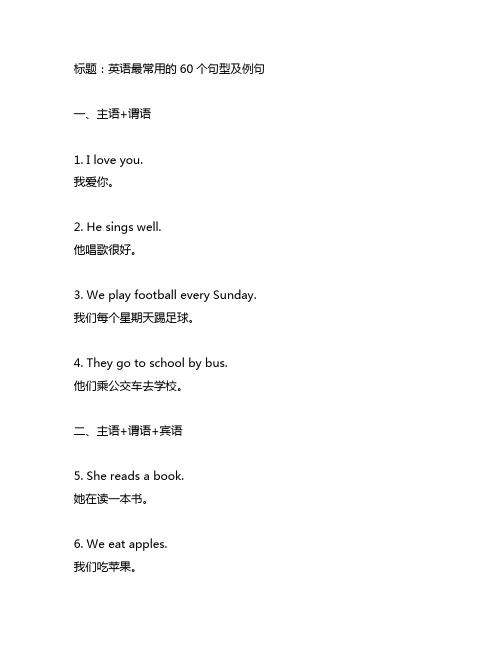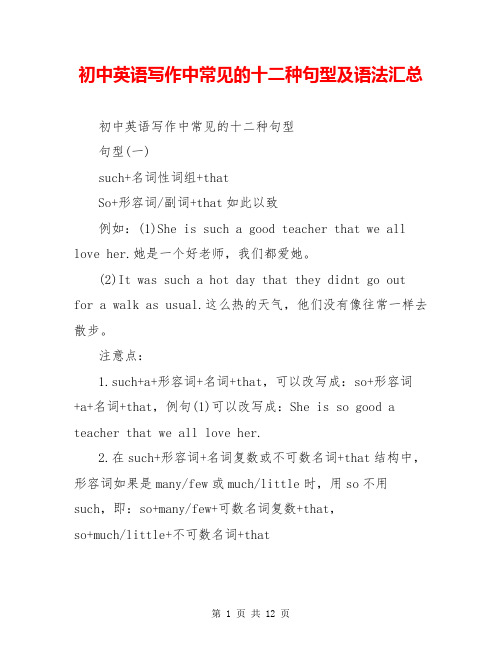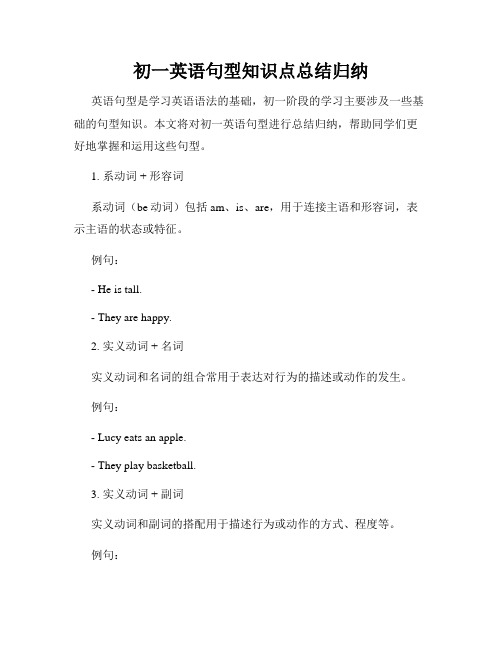初中英语重要句型及例句汇总
英语最常用的60个句型及例句

标题:英语最常用的60个句型及例句一、主语+谓语1. I love you.我爱你。
2. He sings well.他唱歌很好。
3. We play football every Sunday. 我们每个星期天踢足球。
4. They go to school by bus.他们乘公交车去学校。
二、主语+谓语+宾语5. She reads a book.她在读一本书。
6. We eat apples.我们吃苹果。
7. He speaks English.他讲英语。
8. They watch TV.他们看电视。
三、主语+谓语+宾语+宾语补足语9. She paints the wall red.她把墙刷成了红色。
10. We call him a hero.我们称他为英雄。
11. He considers the plan unfeasible. 他认为这个计划不可行。
12. They make their father proud.他们让父亲感到自豪。
四、主语+系动词+表语13. I am a teacher.我是一名老师。
14. She was happy.她很快乐。
15. He is my friend.他是我的朋友。
16. They are students.他们是学生。
五、主语+谓语+间宾+直宾17. She teaches us English. 她教我们英语。
18. He bought her a gift. 他给她买了一份礼物。
19. We tell him a story.我们给他讲故事。
20. They show us the way.他们给我们指路。
六、主语+谓语+宾补+宾语21. She made her sister cry.她让她妹妹哭了。
22. They found the problem solved. 他们发现问题已经解决了。
23. He heard the news spread.他听说了消息已经传开了。
初中英语50个必背句型

初中英语必背句型50个(带例句)句型1:There+be +主语+地点状语/ 时间状语There are three books on the table.桌子上有三本书。
句型2:What's wrong with+sb./sth.?What's wrong with your telephone?你的手机有什么毛病?句型3:How do you like…?How do you like China?你觉得中国怎么样?句型4:What do you like about…?What do you like about China?你喜欢中国的什么?句型5:had better(not)+动词原形You'd better ask that policeman over there.你最好去问问那边的那个警察。
句型7:Thank+sb.+for (doing) sth.Thank you for coming to see me.感谢你来看我。
句型8:So+be/情态动词/助动词+主语He is a student. So am I.他是一个学生,我也是。
句型9:not…until…He didn't have supper until his parents came back.直到他的父母回来他才吃饭。
句型10:比较级十and+比较级The baby cried harder and harder.那孩子哭得越来越厉害。
句型11:the+比较级,the+比较级The more one has,the more one wants.拥有的越多,想要的越多。
句型12:…as+adj./adv.+as……not as(so)+adj./adv.+as…Last Sunday the weather was not so wet as it is today.上个星期天的天气不如今天的天气潮湿。
初中英语写作中常见的十二种句型及语法汇总

初中英语写作中常见的十二种句型及语法汇总初中英语写作中常见的十二种句型句型(一)such+名词性词组+thatSo+形容词/副词+that如此以致例如:(1)She is such a good teacher that we all love her.她是一个好老师,我们都爱她。
(2)It was such a hot day that they didnt go out for a walk as usual.这么热的天气,他们没有像往常一样去散步。
注意点:1.such+a+形容词+名词+that,可以改写成:so+形容词+a+名词+that,例句(1)可以改写成:She is so good a teacher that we all love her.2.在such+形容词+名词复数或不可数名词+that结构中,形容词如果是many/few或much/little时,用so不用such,即:so+many/few+可数名词复数+that,so+much/little+不可数名词+that(1)There are so many people in the room that I cant get in.房间里人太多,我进不去。
(2)The man has so much money that he can buy a car.那人很有钱,他能买一辆小汽车。
句型(二)There be,eitheror,neithernor,not onlybut also例如:(1)There is a pen and two pencils in his pencil-box.他的铅笔盒里有一支钢笔和两支铅笔。
(2)Not only you but also I have been to the Great Wall.你和我都没有去过长城。
(3)Either you or I am leaving for Shanghai.要么你去上海,要么我去上海。
初一英语句型知识点总结归纳

初一英语句型知识点总结归纳英语句型是学习英语语法的基础,初一阶段的学习主要涉及一些基础的句型知识。
本文将对初一英语句型进行总结归纳,帮助同学们更好地掌握和运用这些句型。
1. 系动词 + 形容词系动词(be动词)包括am、is、are,用于连接主语和形容词,表示主语的状态或特征。
例句:- He is tall.- They are happy.2. 实义动词 + 名词实义动词和名词的组合常用于表达对行为的描述或动作的发生。
例句:- Lucy eats an apple.- They play basketball.3. 实义动词 + 副词实义动词和副词的搭配用于描述行为或动作的方式、程度等。
例句:- Tom runs fast.- The dog barks loudly.4. 疑问词 + 系动词 + 主语 + 其他?疑问词用于提问状况或特定部分,系动词与主语组合形成疑问句。
例句:- Are you a student?- Is she at home?5. 疑问词 + 实义动词 + 主语 + 其他?疑问词用于提问方式、原因、时间等,实义动词与主语组合形成疑问句。
例句:- What is your name?- When do you go to school?6. 肯定句 + and + 肯定句使用and连接两个肯定句,表示并列关系。
例句:- I like ice cream and cake.- He sings and dances well.7. 肯定句 + but + 否定句使用but连接肯定句和否定句,表示转折或对比关系。
例句:- She is tall but he is short.- The weather is sunny but it is not hot.8. 肯定句 + or + 否定句使用or连接肯定句和否定句,表示选择关系。
例句:- Do you want coffee or tea?- Shall we go swimming or stay at home?9. 特殊疑问词 + 弹问疑问词 + 陈述句使用特殊疑问词(如what、where、who)和弹问疑问词(如can、could、may)组合,用陈述句的形式提问。
英语八大句型例句

英语八大句型例句
1. 主+谓:I run every morning.(我每天早上跑步呀。
)
2. 主+谓+宾:You like reading books.(你不是喜欢读书嘛。
)
3. 主+谓+间宾+直宾:He gave me a hug.(他给了我一个大大的拥抱呢。
)
4. 主+谓+宾+宾补:They made the room clean.(他们把房间弄得干干净净的呀。
)
5. 主+系+表:She is very happy.(她可开心啦。
)
6. There be 句型:There are many flowers in the garden.(花园里有好多花儿呀。
)
7. 祈使句:Come here!(快过来呀!)
8. 感叹句:How beautiful the scenery is!(这景色真美啊!)
9. 疑问句:Do you know him?(你认识他不?)
10. 强调句:It is you who made the mistake.(就是你犯的错呀。
)
我的观点结论就是:这些例句是不是很简单易懂呀,大家可以多练习,英语八大句型就能轻松掌握啦!。
初中英语句型及总结归纳

初中英语句型及总结归纳英语是我们学习的一门重要课程,而句型是英语中的基础。
在初中英语学习中,我们掌握了许多常用的句子结构,这些句型在日常交流和写作中都起到了关键的作用。
本文将对初中英语的句型进行总结归纳,帮助大家更好地掌握和运用这些句型。
一、陈述句陈述句是我们最常用的句子类型,用来陈述事实、描述情况。
以下是一些常见的陈述句型:1. 主语 + 动词 + 宾语例如:I like pizza.(我喜欢比萨。
)2. 主语 + be动词 + 表语例如:She is a teacher.(她是一名教师。
)3. 主语 + do/does + 动词原形例如:They do their homework every day.(他们每天做作业。
)4. 主语 + have/has + 过去分词例如:He has finished his homework.(他已经完成了作业。
)二、疑问句疑问句用于提问,帮助我们获取信息。
以下是一些常见的疑问句型:1. 疑问词 + 助动词 + 主语 + 动词?例如:What do you like?(你喜欢什么?)2. 助动词 + 主语 + 动词?例如:Do you play basketball?(你打篮球吗?)3. 特殊疑问句例如:Where did you go yesterday?(你昨天去哪里了?)三、祈使句祈使句用于表达请求、命令或建议。
以下是一些常见的祈使句型:1. 动词原形 + 其他成分例如:Open the window, please.(请打开窗户。
)2. 动词原形 + 不定代词/名词例如:Eat some fruit.(吃些水果。
)四、感叹句感叹句用于表达惊讶、赞美、喜悦等情感。
以下是一些常见的感叹句型:1. How + 形容词/副词 + 主语 + 动词!例如:How beautiful the flowers are!(花儿多美啊!)2. What + 形容词 + 名词 + 主语 + be动词!例如:What a lovely dog he has!(他有一只多可爱的狗啊!)五、条件句条件句用于表达假设、条件和结果之间的关系。
2023初中英语高频考点的60个句型总结
2023初中英语高频考点的60个句型总结想要你的期末考试英语复习轻松点吗?不妨可以参考一下我为大家整理的学校英语高频考点60个句型总结,假如有想要学校英语考试高分的同学们抓紧过来记笔记啦。
1. asas 和一样中间必需用形容词或副词原级。
例如:This classroom is as big as that one.这间教室和那间一样大。
He runs as fast as Tom. 他和汤姆跑的一样快。
否定结构:not as/soas,“不如”。
上面的两个句子可分别改为: This classroom is not as/so large as that one.这间教室不如那间大。
He doesnt run as/so fast as Tom.他跑得不如汤姆快。
2. as soon as 一就用来引导时间状语从句。
若主句是一般将来时,从句要用一般现在时。
例如:Ill tell him the plan as soon as I see him.我一看到他就告知他这个方案。
Hell go home as soon as he finishes his work.他一完成工作就回家。
3. be busy/enjoy/hate/go on/finish doing sth. 忙于/喜爱/厌烦/连续/完成做某事在enjoy, finish, hate, go on, be busy等词语后,一般用动词-ing形式作宾语。
例如:Lin Tao is busy making a model plane.林涛正忙着做飞机模型。
My mother enjoys taking a walk after supper.我妈妈喜爱晚饭后漫步。
I hate watching Channel Five.我厌烦看五频道。
When someone asked him to have a rest, he just went on working.当有人让他休息一会儿时,他仍连续工作。
初中英语句型大全汇总及例句
初中英语句型大全汇总及例句句型1: What is your favorite food?- My favorite food is pizza.- 我最喜欢的食物是披萨。
句型2: What did you do last weekend?- Last weekend, I went hiking with my friends.- 上个周末,我和朋友去爬山了。
句型3: How do you go to school?- I usually go to school by bus.- 我通常乘公交车上学。
句型4: Why do you like English?- I like English because it sounds beautiful.- 我喜欢英语是因为它听起来很美。
句型5: Can you tell me about your family?- Sure, I have a small family. My parents and I live together.- 当然,我家庭很小,我和父母住在一起。
句型6: What is your dream job?- My dream job is to become a doctor and help people.- 我的梦想工作是成为一名医生,帮助他人。
句型7: Have you ever been to the Great Wall?- Yes, I have been to the Great Wall. It was amazing!- 是的,我去过长城,那里很棒!句型8: What do you like to do in your free time?- In my free time, I like to read books and listen to music.- 我空闲时间喜欢读书和听音乐。
句型9: Where is your favorite place to visit?- My favorite place to visit is Paris because of its beautiful architecture.- 我最喜欢去的地方是巴黎,因为那里有美丽的建筑。
62个常用英语句型和例句
62个常用英语句型和例句:1. Subject + used to + verb...意思:表示过去常常做某事,现在不再做了。
I used to play basketball every day.我过去每天打篮球。
She used to get up early.她过去早起。
John used to stay up late.约翰过去经常熬夜。
2. Subject + be used to + verb-ing/noun.意思:表示习惯于做某事或习惯于某物。
She is used to getting up early.她习惯早起。
He is used to the cold weather.他习惯了寒冷的天气。
They are used to working late.他们习惯了工作到很晚。
3. Subject + prefer + noun/verb-ing + to + noun/verb-ing.意思:表示更喜欢做某事而不是另一件事。
I prefer reading to watching TV.我更喜欢阅读而不是看电视。
She prefers tea to coffee.她更喜欢茶而不是咖啡。
They prefer walking to driving.他们更喜欢步行而不是开车。
4. Subject + had better (not) + verb...意思:表示建议最好做某事或不做某事。
You had better finish your homework.你最好完成作业。
She had better not go out tonight.她今晚最好不要外出。
We had better take an umbrella.我们最好带把伞。
5. It seems that...意思:表示似乎,好像。
It seems that he is not coming.他似乎不来了。
It seems that they are busy.他们似乎很忙。
七年级英语所有重点句型公式
七年级英语所有重点句型公式一、一般现在时。
1. 主语 + be动词(am/is/are)+ 其他。
- I am a student.(我是一名学生。
)- He is my brother.(他是我的兄弟。
)- They are good friends.(他们是好朋友。
)2. 主语(第三人称单数)+ 动词第三人称单数形式(+s/es)+ 其他。
- She likes reading books.(她喜欢读书。
)- My father often watches TV in the evening.(我爸爸经常在晚上看电视。
)3. 主语(非第三人称单数)+ 动词原形+ 其他。
- We play football after school.(我们放学后踢足球。
)- You have a nice pen.(你有一支漂亮的钢笔。
)二、一般疑问句及其回答。
1. Be动词(am/is/are)开头的一般疑问句。
- 结构:Be动词 + 主语+ 其他?- 例如:Are you a teacher?(你是一名老师吗?)- 肯定回答:Yes, I am.(是的,我是。
)- 否定回答:No, I'm not.(不,我不是。
)- Is he at home?(他在家吗?)- 肯定回答:Yes, he is.(是的,他在。
)- 否定回答:No, he isn't.(不,他不在。
)2. 助动词(do/does)开头的一般疑问句(用于行为动词的一般现在时)- 结构:Do/Does+主语+动词原形+其他?- 例如:Do you like music?(你喜欢音乐吗?)- 肯定回答:Yes, I do.(是的,我喜欢。
)- 否定回答:No, I don't.(不,我不喜欢。
)- Does she go to school by bike?(她骑自行车去上学吗?)- 肯定回答:Yes, she does.(是的,她是。
